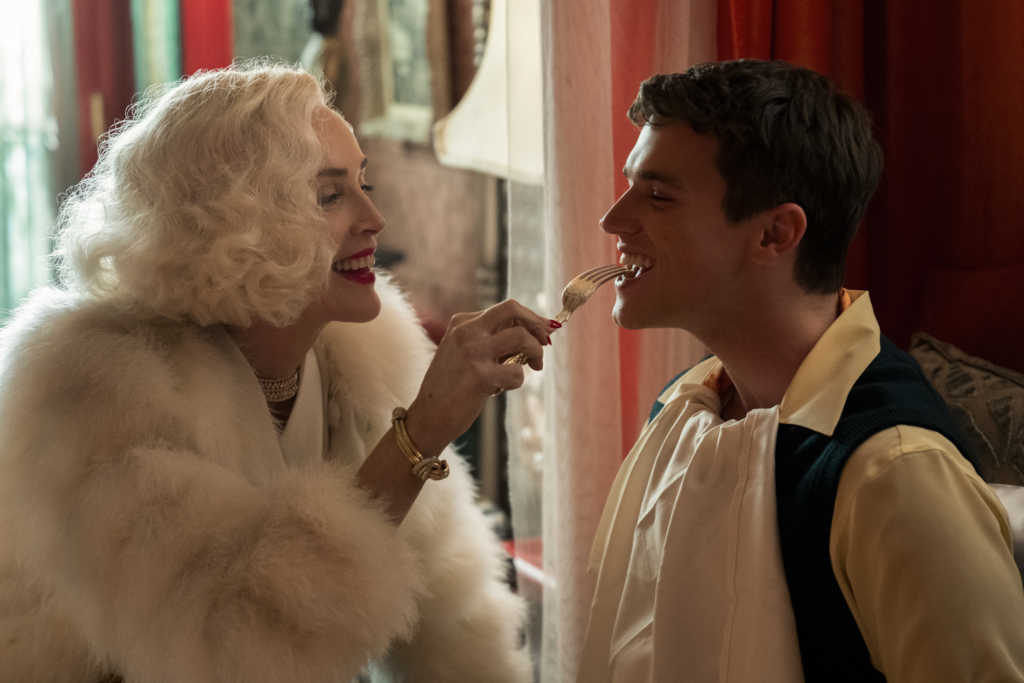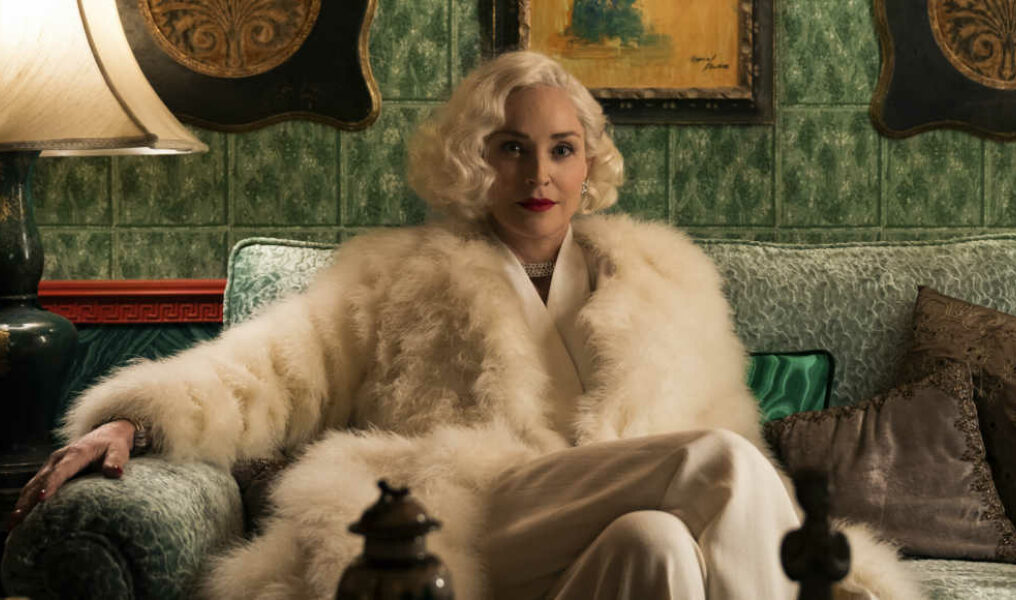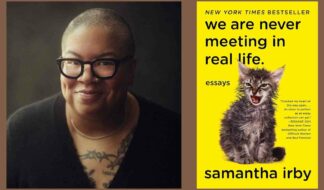That scene. You know the one: the one in "Basic Instinct" where Sharon Stone's legs are open. It's been talked about and talked about, and talked about some more. It's been talked about so much in the years since it shook the world in 1992 that it has diminished the other non-crotch facets of Sharon Stone.
What nobody talks about anymore is her heart, her courage and her activism. As Stone pushed through the male-dominating Hollywood sphere of the 1990s to reach top-tier cinematic heights through her work in 1990's "Total Recall" and then "Basic Instinct," an Oscar nomination for "Casino" solidifying her influential screen presence, she was giving a voice to the voiceless. She was speaking up for marginalized women. She was speaking up for the LGBTQ community. She was speaking up for herself.
And to this day, she still does.
Stone's enduring affinity with the LGBTQ community might explain why working for the first time with Ryan Murphy, known for bringing actresses over 50 (Jessica Lange, Kathy Bates, and now Stone) into his lavishly stylized queerverse of prestige TV, was so special. In Murphy's dark dramedy "Ratched" for Netflix, an origins story of Nurse Ratched of "One Flew Over the Cuckoo's Nest," the 62-year-old actress portrays the deliciously insane Lenore Osgood, a rich, twice-widowed mother who'd rather spend time with her Capuchin monkey than her queer son (played by openly gay actor Brandon Flynn). The series also stars out actresses Sarah Paulson, as nurse Mildred Ratched, and "Sex and the City" star and political activist Cynthia Nixon, who portrays Gwendolyn Briggs, the press secretary for the Governor of California.
When I spoke with Stone recently by phone, she did talk about the show's queerness. But it was the touching story of her late father, Joe, who took her gay friends under his wing, that you won't forget.
Where do you think your role as Lenore Osgood will rate on the "Things Queer People Love That I've Done" scale?
Right? (Laughs.) I have to say that it's full of beauty and full of style and full of the immense tenderness that happens when we confront abuse. And because of the nature of what it is to live a queer life, I think all of that will be very moving.

While watching "Ratched," I was reflecting on your LGBTQ roles. There's been some that are blatantly queer, and others that are more nuanced in their queerness. "Catwoman" with Halle Berry came to mind because I really do think it's part of the queer canon.
(Laughs.) I think because the character was so intriguing – and so catty, also! And I think because the character was really based in an intense beauty-centric world, maybe. I just feel like my characters are all based in a "for everybody" kind of world, but I really believe there's something when you work for people who are gay-friendly and people who hire gay people on the set, where costumes and sets and things have an opportunity to grow and become even more lavish.
We shot ("Catwoman") in Tony Duquette's estate house (Duquette was an artist who specialized in fantastical set designs for stage and film); he was a very good friend of mine and, you know, he said to me when he met me, "I haven't seen any of your pictures, darling." But truly he was engaged in the (Canadian-American film actress and Duquette's wife) Mary Pickford and (silent film actor) Douglas Fairbanks universe and swashbuckler films and all of these extremely lavish and beautiful filmmaking experiences.
One was not allowed to have a homosexual identity in those periods, so people had partners and the partnerships were agreements, and they were often very artistic agreements. In this case, very beautiful artistic agreements, very accomplished artistic agreements. And this was a way to love, be loved, be safe, be protective and work in the industry.
You've worked with straight directors as well as gay and queer directors. Ryan Murphy now among them. And when I think of him and the gay men I know, I think of the reverence and respect we have for women. Based on your experiences, what is different for you working with straight male directors versus gay or queer male directors and their treatment of the women that you've played?
(Laughs tellingly, as if she has a lot to say about this.) That's a beautiful question. Well, it doesn't just break down to gay and straight; it breaks down to people who have self-respect and people who do not. And our business was very much dominated by straight men – and a lot of straight men who felt that self-respect for them meant that there wasn't any for women.
Now that we are opening the business to a more sincere and honest appraisal of reality, women, men, gays and straights get to participate in the business with a treatment of white male abuse, which is starting to calm down but not completely. And as we can see from our worldview here and certainly from our national view, the resistance to the end of it, it's so violent; the resistance to the end of white male supremacy is so violent, and the women who have thrived on being victims and being victimized are unsure of what to do too because being a victim is an identity and having that situation where you call your husband or wife "mommy and daddy" is also part of that system. There's a whole mindset that goes with that system that's leaving, and as that leaves we have to start addressing all the other things, the underbelly of that, like child abuse and pedophilia.
When it comes to "Ratched" and working with someone like Ryan Murphy, who loves women differently than a straight man might, do you notice a difference in the way the character is being treated? For instance, was your experience different on, say, the set of "Basic Instinct"?
Well, I was protected on "Basic Instinct" because I had a European director (Paul Verhoeven). I had a very intelligent European director, so I was protected. I was not abused at all, or I could never have been able to play that part. We made agreements even prior to shooting that if we had disagreements we would take them off the set and into a private place and talk so that it wouldn't tear down the authority of the character.
When "Basic Instinct" was released, it agitated LGBTQ activists who were taken aback by your character being a bisexual psychopath. Seeing as though you were passionate about LGBTQ issues and you are an activist for the community, how did you process their concerns at the time?
At the time we had all kinds of problems, not just LGBTQ people feeling like they were going to be abused and not knowing what was going to happen and showing great concern. But there were just people acting out all over the place over this movie. People blowing horns, trying to destroy the sets.
So (co-star) Michael Douglas and Sherry Lansing, the head of Paramount Pictures, and I sat down and we talked about it. I said that I would be very happy to become the person who talked about these LGBTQ issues and to discuss that what we were trying to do was put LGBTQ characters in a major motion picture from Paramount and that we were trying to, for the first time ever, do this. That we were trying to give the LGBTQ community a platform. And that I would take on the position of being the voice of that platform if this community would trust me.
And you did.
And I did. And Micheal and Sherry were like, "You're willing to do this?" And I'm like, "I'm absolutely willing to do this, and there's nothing about me that would cause people to distrust that that's what I'm going to do."
Would you say that was the moment in your life when LGBTQ issues became especially important to you?
I was already working for amfAR (The Foundation for AIDS Research, which Stone began working for in 1995, as Global Campaign Chair) at that time, so no. And I had already begun working for the Pediatric AIDS Foundation because my neighbor had funded it. So I was already heavily working on that with our pediatrician Dr. Peter S. Waldstein and his wife. I was into the pediatric aspect of it, and then I went to the Dominican Republic as a guest of the president because they were beginning to have extreme AIDS issues. This was a really long time ago. This was even before amfAR. Then amfAR asked me if I would work for them.
Getting back to film, I'm curious about your role in the 2000 HBO film "If These Walls Could Talk 2." You must still get stopped by lesbians everywhere you go for being a part of that movie.
Well, I just think it was really great that we had this opportunity for Anne Heche to direct Ellen (DeGeneres) and I. Ellen was so brave and so cool to come out, use her platform to get so much good work done. Vermont changed their laws after we did that film (the year the film was released, Vermont became the first U.S. state to pass same-sex civil union legislation). The Vermont senator (James Merrill Jeffords) then changed from being a Republican to a Democrat, and I went to visit him at the Senate in Washington and there was a lot more action.
I know everybody wants to be mad at Ellen right now, but let's not forget all of the incredible things she took on her own shoulders and her own back, and the pressure she took. I mean, when we did that, my parents were like, "Why are you doing this? And what are you doing?" And when I really explained it to them, my dad was like, "So you mean those two uncles that lived together down the road were queer? And those old ladies were queer?" And I'm like, "Yeah, dad." And he's like, "Well, isn't that nice. So they weren't lonely and alone." And I'm like, "Yeah, dad; they weren't lonely and alone." And he goes, "Well, that's so good."
That's a beautiful response.
Right? So he started to have this revelation about all these old men or old women that he'd known all his life that lived together that weren't alone and lonely. He started inviting my gay friends up to the hunting cabin, including my friend whose father had kind of dismissed him as not being masculine enough to do anything. My dad would take them out on the boat and teach them how to shoot and fish and drive the boat and walk in the woods. These were my 40 and 50 year old friends who were standing up and saying, "I had a dad but my real dad was Joe Stone because this is what he did for me. He taught me how to shoot a bow and arrow." All of these things that their dads wouldn't spend the time doing with them because they were mad at them for being gay.
I'm getting a mental image of me, a gay man, learning to walk in the woods from your father and what that experience might have been like.
At my dad's memorial, one of my friends stood up and he said, "I don't suppose you would recognize why I'm such a fashion plate in these flannel shirts, but these were Joe Stone's shirts and he treated me like I was his son."
Did your dad ever see "If These Wall Could Talk 2" then?
Of course. He saw everything. He died 10 years ago, and he really became a very Zen-like dude who actually talked to a lot of my friends about a lot of big things in their lives. He used to do this thing where he'd go, "I'm gonna go out to the hardware store," and he wouldn't come back for seven or eight hours. He'd go to the hardware store and he'd go to the little shops and he'd go sit in the park and he'd literally wait for a person who needed to talk to him and help people with their life traumas. I can't tell you how many people – giant businessmen, rock stars, political figures – that have come to me saying, "I knew your dad and I was having such a terrible time and I sat with your father and he helped me. Your father changed my life." It was just all these walks that he went on, and all these walks to the hardware store.
Do you think you've been influenced by him in regards to the work that you do for the LGBTQ community but also how vocal you are about other causes that matter to you?
Yes, by both my mother and my father. Because my mother always said, "It doesn't matter who you love, it matters that you love."
I couldn't end this interview without mentioning the fact that you performed with Kylie Minogue in Cannes for AIDS research, and then you gave the gays an iconic moment with Mariah Carey on the red carpet at the 2018 Golden Globes and said you were going to trade diamonds with her. Did you realize the gay magic you were creating in both of those moments with two of our biggest gay icons?
No, but I can tell you that both of those women have been through their own personal major difficulties and giant triumphs. I admire both of them for being able to live in the public life and continue to be so generous.
I admire that about you because you have also been that person. I'm so happy we have your voice and that it's been heard.
Thank you. One-hundred percent, you can count on me.











